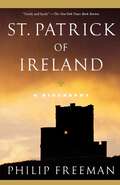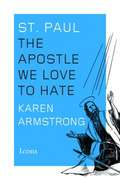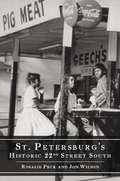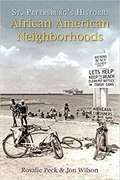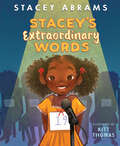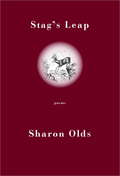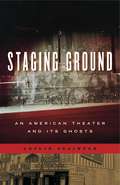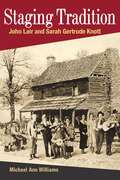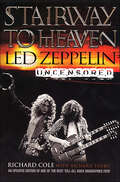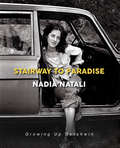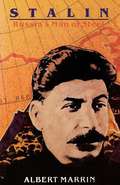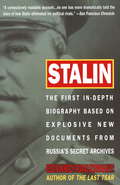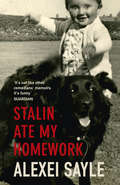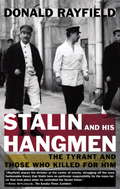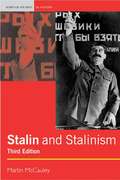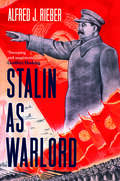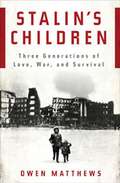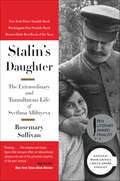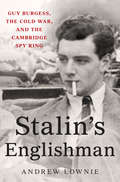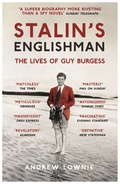- Table View
- List View
St. Patrick of Ireland: A Biography
by Philip Freeman"Lively and lucid." —The New York Times Book Review The most authoritative modern biography of the patron saint of Ireland, focusing on the historical Patrick and his times.Ireland&’s patron saint has long been shrouded in legend, but the true story of St. Patrick is far more inspiring than the myths. In St. Patrick of Ireland, Philip Freeman brings the historic Patrick and his world vividly to life. Patrick speaks in his own voice in two remarkable letters he wrote about himself and his beliefs, new translations of which are included here and which are still astonishing for their passion and eloquence. Born late in the fourth century to an aristocratic British family, Patrick&’s life was changed forever when he was abducted and taken to Ireland just before his sixteenth birthday. He spent six grueling years there as a slave, but the ordeal turned him from an atheist into a true believer. After a vision in which God told him he would go home, Patrick escaped captivity and, following a perilous journey, returned safely to Britain to the amazement of his family. But even more amazing to them was his announcement that he intended to go back to Ireland to spend the rest of his life ministering to the people who had once enslaved him. Set against the turbulent backdrop of the British Isles during the last years of the Roman Empire, St. Patrick of Ireland brilliantly brings to life the real Patrick, a man whose deep spiritual conviction and devotion helped to transform a country.
St. Paul: The Apostle We Love to Hate
by Karen ArmstrongSt. Paul is known throughout the world as the first Christian writer, authoring fourteen of the twenty-seven books in the New Testament. But as Karen Armstrong demonstrates, he also exerted a more significant influence on the spread of Christianity throughout the world than any other figure in history. It was Paul who established the first Christian churches in Europe and Asia in the first century, Paul who transformed a minor sect into the largest religion produced by Western civilization, and Paul who advanced the revolutionary idea that Christ could serve as a model for the possibility of transcendence. While we know little about some aspects of the life of St. Paul--his upbringing, the details of his death--his dramatic vision of God on the road to Damascus is one of the most powerful stories in the history of Christianity, and the life that followed forever changed the course of history. Some books, long-held to be written by Paul, were not written by him and some of his books were later edited to contain material not by him.
St. Petersburg's Historic 22nd Street South (American Heritage)
by Jon Wilson Rosalie PeckThroughout the city's history, no other area has personified strength for the African American community like this segregation-era thoroughfare. A haven during the brutal Jim Crow years, 22nd Street South was a place where prominent businessmen and community leaders were the role models and residents and neighbors looked out for one another. <p><p> The close-knit community encouraged strong, positive values even as its members were treated as second-class citizens in the wider world. Authors Wilson and Peck tell the story of this unique district and how its people and events contributed to and helped to shape the history of St. Petersburg in the context of the greater South and the Civil Rights Movement.
St. Petersburg's Historic African American Neighborhoods: Community, Culture, and Connection (American Heritage)
by Jon Wilson Rosalie PeckPepper Town, Methodist Town, the Gas Plant district and the 22nd Street South community--these once segregated neighborhoods were built by African Americans in the face of injustice. The resilient people who lived in these neighbourhoods established strong businesses, raised churches, created vibrant entertainment spots and forged bonds among family and friends for mutual well-being. <p><p> After integration, the neighbourhoods eventually gave way to decay and urban renewal, and tales of unquenchable spirit in the face of adversity began to fade. In this companion volume to St. Petersburg's Historic 22nd Street South, Rosalie Peck and Jon Wilson share stories of people who built these thriving communities, and offer a rich narrative of hardships overcome, leaders who emerged and the perseverance of pioneers who kept the faith that a better day would arrive.
Stacey's Extraordinary Words
by Stacey Abrams#1 New York Times bestseller and NAACP Image Award winner! The debut picture book from iconic voting rights advocate and bestselling author Stacey Abrams is an inspiring tale of determination, based on her own childhood. Stacey is a little girl who loves words more than anything. She loves reading them, sounding them out, and finding comfort in them when things are hard. But when her teacher chooses her to compete in the local spelling bee, she isn’t as excited as she thought she’d be. What if she messes up? Or worse, if she can’t bring herself to speak up, like sometimes happens when facing bullies at school? Stacey will learn that win or lose . . . her words are powerful, and sometimes perseverance is the most important word of all. Plus don't miss the follow-up from the same team, Stacey's Remarkable Books!
Stag's Leap
by Sharon OldsIn this wise and intimate new book, Sharon Olds tells the story of a divorce, embracing strands of love, sex, sorrow, memory, and new freedom. As she carries us through the seasons when her marriage was ending, Olds opens her heart to the reader, sharing the feeling of invisibility that comes when we are no longer standing in love's sight; the surprising physical bond that still exists between a couple during parting; the loss of everything from her husband's smile to the set of his hip; the radical change in her sense of place in the world. Olds is naked before us, curious and brave and even generous toward the man who was her mate for thirty years and who now loves another woman. As she writes in the remarkable "Stag's Leap," "When anyone escapes, my heart / leaps up. Even when it's I who am escaped from, / I am half on the side of the leaver." Olds's propulsive poetic line and the magic of her imagery are as lively as ever, and there is a new range to the music--sometimes headlong, sometimes contemplative and deep. Her unsparing approach to both pain and love makes this one of the finest, most powerful books of poetry she has yet given us.
Staging Ground: An American Theater and Its Ghosts (Keystone Books)
by Leslie StaintonIn this poignant and personal history of one of America’s oldest theaters, Leslie Stainton captures the story not just of an extraordinary building but of a nation’s tumultuous struggle to invent itself. Built in 1852 and in use ever since, the Fulton Theatre in Lancaster, Pennsylvania, is uniquely ghosted. Its foundations were once the walls of a colonial jail that in 1763 witnessed the massacre of the last surviving Conestoga Indians. Those same walls later served to incarcerate fugitive slaves. Staging Ground explores these tragic events and their enduring resonance in a building that later became a town hall, theater, and movie house—the site of minstrel shows, productions of Uncle Tom’s Cabin, oratory by the likes of Thaddeus Stevens and Mark Twain, performances by Buffalo Bill and his troupe of “Wild Indians,” Hollywood Westerns, and twenty-first-century musicals. Interweaving past and present, private anecdote and public record, Stainton unfolds the story of this emblematic space, where for more than 250 years Americans scripted and rescripted their history. Staging Ground sheds light on issues that continue to form us as a people: the evolution of American culture and faith, the immigrant experience, the growth of cities, the emergence of women in art and society, the spread of advertising, the flowering of transportation and technology, and the abiding paradox of a nation founded on the principle of equality for “all men,” yet engaged in the slave trade and in the systematic oppression of the American Indian.
Staging Ground: An American Theater and Its Ghosts (Keystone Books)
by Leslie StaintonIn this poignant and personal history of one of America’s oldest theaters, Leslie Stainton captures the story not just of an extraordinary building but of a nation’s tumultuous struggle to invent itself. Built in 1852 and in use ever since, the Fulton Theatre in Lancaster, Pennsylvania, is uniquely ghosted. Its foundations were once the walls of a colonial jail that in 1763 witnessed the massacre of the last surviving Conestoga Indians. Those same walls later served to incarcerate fugitive slaves. Staging Ground explores these tragic events and their enduring resonance in a building that later became a town hall, theater, and movie house—the site of minstrel shows, productions of Uncle Tom’s Cabin, oratory by the likes of Thaddeus Stevens and Mark Twain, performances by Buffalo Bill and his troupe of “Wild Indians,” Hollywood Westerns, and twenty-first-century musicals. Interweaving past and present, private anecdote and public record, Stainton unfolds the story of this emblematic space, where for more than 250 years Americans scripted and rescripted their history. Staging Ground sheds light on issues that continue to form us as a people: the evolution of American culture and faith, the immigrant experience, the growth of cities, the emergence of women in art and society, the spread of advertising, the flowering of transportation and technology, and the abiding paradox of a nation founded on the principle of equality for “all men,” yet engaged in the slave trade and in the systematic oppression of the American Indian.
Staging Tradition: John Lair and Sarah Gertrude Knott (Music in American Life)
by Michael Ann WilliamsBased on extensive archival research and oral history, Staging Tradition traces the parallel careers of the creators of the Renfro Valley Barn Dance and the National Folk Festival. Through their devotion to the staging of traditional culture, including folk, country, and bluegrass music, John Lair (1894-1985) and Sarah Gertrude Knott (1895-1984) became two of the mid-twentieth century's most notable producers. Lair and Knott's discovery of new developments in theater and entertainment during the 1920s led the pair to careers that kept each of them center stage. Inspired by programs such as WLS's Barn Dance and the success of early folk events, Lair promoted Kentucky musicians. Knott staged her own radically inclusive festival, which included Native and African American traditions and continues today as the National Folk Festival. Michael Ann Williams shows how Lair and Knott fed the public's fascination with the "art of the common man" and were in turn buffeted by cultural forces that developed around and beyond them.
Stairway To Heaven: Led Zeppelin Uncensored
by Richard Cole Richard TruboThis account of Led Zeppelin’s decadent life on the road by their longtime tour manager “dishes up the real dirt as only an insider’s report can” (Kirkus Reviews).No one knew Led Zeppelin like Richard Cole. The band’s tour manager for more than a decade, Cole was there when they burst onto the music scene, achieved cult status, cut platinum records, and transformed popular music. Second only to the Beatles in sales for years, Led Zeppelin was rock’s premier group. But unlike the boys from Liverpool, the excitement of this band’s music was matched by the fever pitch of their antics on and off the stage.In hotel rooms and stadiums, in a customized private Boeing 707 jet and country estates, Richard Cole saw it all—and tells it all in this close-up, down-and-dirty, no-holds-barred account that records the highs, the lows, and the occasional in-betweens. This revised edition includes updates on the band members’ lives and careers, which may be a little quieter now, but their songs remain the same.
StairwaytoParadise
by Nadia NataliHer father invented Kodachrome, and her mother--who sang and danced professionally--was the sister of George and Ira Gershwin. Growing up in Westport, Connecticut amidst great privilege and uncommon fame, Nadia Natali might have chosen a life of comfort and celebrity. But from an early age, she was driven to create one of great consequence instead, one in which she could seek her true purpose and life’s deepest meanings. When she met photographer Enrico Natali, the two embarked on a shared quest not simply for adventure, but also a journey to discover how their lives could most profoundly unfold. Their yearnings for lives fully-lived took them to a wild and wonderful piece of property surrounded by the Los Padres National Forest in the coastal mountains of Southern California--a place where they lived in a teepee, started a family, and carved out rich satisfaction as they transformed their beautiful piece of earth into Blue Heron Ranch. The forty years between then and now have been filled with unimaginable adventures, the kind of tragedy that can utterly destroy the lives of those who must endure them and go on, deep introspection and personal growth, as well as joy and gratitude as bounteous as the natural world surrounding them. Stairway to Paradise is a memoir of uncommon honesty and clarity, the story of one woman’s determination to make the most of the gifts her family heritage has offered her, and to live wisely and honorably in every way one can. This is a book to savor, one that will make you cry and marvel at how essential it is for all of us to bring a commitment to truth and openhearted honesty to all our challenges as well as our many blessings.
Stalin
by Albert MarrinEnamored as a young man with the revolutionary politics of Lenin, he joined the underground Marxist Party and began his pursuit of power by leading strikes and demonstrations. <P><P>Six times he was exiled to Siberia for his illicit activities, escaping many times despite below freezing temperatures and on one occasion an attack by a pack of wolves.
Stalin
by Edvard RadzinskyFrom the author of The Last Tsar, the first full-scale life of Stalin to have what no previous biography has entirely gotten hold of: the facts. Granted privileged access to Russia's secret archives, Edvard Radzinsky paints a picture of the Soviet strongman as more calculating, ruthless, and blood-crazed than has ever been described or imagined. Stalin was a man for whom power was all, terror a useful weapon, and deceit a constant companion. As Radzinsky narrates the high drama of Stalin's epic quest for domination-first within the Communist Party, then over the Soviet Union and the world-he uncovers the startling truth about this most enigmatic of historical figures. Only now, in the post-Soviet era, can what was suppressed be told: Stalin's long-denied involvement with terrorism as a young revolutionary; the crucial importance of his misunderstood, behind-the-scenes role during the October Revolution; his often hostile relationship with Lenin; the details of his organization of terror, culminating in the infamous show trials of the 1930s; his secret dealings with Hitler, and how they backfired; and the horrifying plans he was making before his death to send the Soviet Union's Jews to concentration camps-tantamount to a potential second Holocaust. Radzinsky also takes an intimate look at Stalin's private life, marked by his turbulent relationship with his wife Nadezhda, and recreates the circumstances that led to her suicide. As he did in The Last Tsar, Radzinsky thrillingly brings the past to life. The Kremlin intrigues, the ceaseless round of double-dealing and back-stabbing, the private worlds of the Soviet Empire's ruling class-all become, in Radzinsky's hands, as gripping and powerful as the great Russian sagas. And the riddle of that most cold-blooded of leaders, a man for whom nothing was sacred in his pursuit of absolute might--and perhaps the greatest mass murderer in Western history--is solved.From the Trade Paperback edition.
Stalin Ate My Homework
by Alexei Sayle'Fascinating and hugely entertaining' Daily Telegraph'It's not like other comedians' memoirs. It's funny' GuardianTHE SAYLES MIGHT NOT HAVE BEEN THE ONLY JEWISH ATHEIST COMMUNIST FAMILY IN LIVERPOOL, BUT ALEXEI KNEW FROM AN EARLY AGE THAT THEY WERE ONE OF THE MORE ECCENTRIC.Born on the day egg rationing came to an end, Alexei was the only child of Joe, an affable trade unionist who led the family on railway expeditions across eastern Europe, and Molly, a hot-tempered red-head who terrified teachers and insisted Alexei see the Red Army Choir instead of the Beatles.Perceptive and hilarious, this is a portrait of a family, a city, a country and a continent going through enormous changes.'Sayle's book has charm and substance, both as memoir and history' Times Literary Supplement
Stalin Ate My Homework
by Alexei Sayle'Fascinating and hugely entertaining' Daily Telegraph'It's not like other comedians' memoirs. It's funny' GuardianTHE SAYLES MIGHT NOT HAVE BEEN THE ONLY JEWISH ATHEIST COMMUNIST FAMILY IN LIVERPOOL, BUT ALEXEI KNEW FROM AN EARLY AGE THAT THEY WERE ONE OF THE MORE ECCENTRIC.Born on the day egg rationing came to an end, Alexei was the only child of Joe, an affable trade unionist who led the family on railway expeditions across eastern Europe, and Molly, a hot-tempered red-head who terrified teachers and insisted Alexei see the Red Army Choir instead of the Beatles.Perceptive and hilarious, this is a portrait of a family, a city, a country and a continent going through enormous changes.'Sayle's book has charm and substance, both as memoir and history' Times Literary Supplement
Stalin and His Hangmen: The Tyrant and Those Who Killed for Him
by Donald RayfieldStalin did not act alone. The mass executions, the mock trials, the betrayals and purges, the jailings and secret torture that ravaged the Soviet Union during the three decades of Stalin's dictatorship, were the result of a tight network of trusted henchmen (and women), spies, psychopaths, and thugs. At the top of this pyramid of terror sat five indispensable hangmen who presided over the various incarnations of Stalin's secret police. Now, in his harrowing new book, Donald Rayfield probes the lives, the minds, the twisted careers, and the unpunished crimes of Stalin's loyal assassins. Founded by Feliks Dzierzynski, the Cheka-the Extraordinary Commission-came to life in the first years of the Russian Revolution. Spreading fear in a time of chaos, the Cheka proved a perfect instrument for Stalin's ruthless consolidation of power. But brutal as it was, the Cheka under Dzierzynski was amateurish compared to the well-oiled killing machines that succeeded it. Genrikh Iagoda's OGPU specialized in political assassination, propaganda, and the manipulation of foreign intellectuals. Later, the NKVD recruited a new generation of torturers. Starting in 1938, terror mastermind Lavrenti Beria brought violent repression to a new height of ingenuity and sadism. As Rayfield shows, Stalin and his henchmen worked relentlessly to coerce and suborn leading Soviet intellectuals, artists, writers, lawyers, and scientists. Maxim Gorky, Aleksandr Fadeev, Alexei Tolstoi, Isaak Babel, and Osip Mandelstam were all caught in Stalin's web-courted, toyed with, betrayed, and then ruthlessly destroyed. In bringing to light the careers, personalities, relationships, and "accomplishments" of Stalin's key henchmen and their most prominent victims, Rayfield creates a chilling drama of the intersection of political fanaticism, personal vulnerability, and blind lust for power spanning half a century. Though Beria lost his power-and his life-after Stalin's death in 1953, the fundamental methods of the hangmen maintained their grip into the second half of the twentieth century. Indeed, Rayfield argues, the tradition of terror, far from disappearing, has emerged with renewed vitality under Vladimir Putin. Written with grace, passion, and a dazzling command of the intricacies of Soviet politics and society, Stalin and the Hangmen is a devastating indictment of the individuals and ideology that kept Stalin in power.
Stalin and His Times
by Arthur E. AdamsThis biography details Stalin's rise to power and his influence on the development of the Soviet Union.
Stalin and Stalinism
by Martin MccauleyWho was Stalin and what did he achieve? Why did he come to power and how did he use that power? The third edition of this best-selling Seminar Study answers these questions and provides the latest research, interpretations and historiographical debates about one of the most fascinating figures of the twentieth century. One of the most successful and lethal dictators of the twentieth century, Stalin transformed the Soviet Union into a modern industrial state. While he demonstrated Russia's huge potential if harnessed correctly, Stalin's brand of coercive socialism sent millions to their deaths in the process. The debate about Stalin's role in creating the Soviet superpower still rages. Was the violence justified? To what extent was Stalin the master of events? Now thoroughly updated to incorporate the most recent research, and including a completely new chapter on Stalin's personality and power, the new edition provides the essential introduction to the Stalin phenomenon.
Stalin and the Struggle for Supremacy in Eurasia
by Alfred J. RieberThis is a major new study of the successor states that emerged in the wake of the collapse of the great Russian, Habsburg, Iranian, Ottoman and Qing Empires and of the expansionist powers who renewed their struggle over the Eurasian borderlands through to the end of the Second World War. Surveying the great power rivalry between the Soviet Union, Nazi Germany and Imperial Japan for control over the Western and Far Eastern boundaries of Eurasia, Alfred J. Rieber provides a new framework for understanding the evolution of Soviet policy from the Revolution through to the beginning of the Cold War. Paying particular attention to the Soviet Union, the book charts how these powers adopted similar methods to the old ruling elites to expand and consolidate their conquests, ranging from colonisation and deportation to forced assimilation, but applied them with a force that far surpassed the practices of their imperial predecessors.
Stalin as Warlord
by Alfred J. RieberAn authoritative account of Stalin as a wartime leader—showing how his paradoxical policies of mass mobilization and repression affected all aspects of Soviet society The Second World War was the defining moment in the history of the Soviet Union. With Stalin at the helm, it emerged victorious at a huge economic and human cost. But even before the fighting had ended, Stalin began to turn against the architects of success. In this original and comprehensive study, Alfred J. Rieber examines Stalin as a wartime leader, arguing that his policies were profoundly paradoxical. In preparation for the war, Stalin mobilized the whole of Soviet society in pursuit of his military goals and intensified the centralization of his power. Yet at the same time, his use of terror weakened the forces vital to the defense of the country. In his efforts to rebuild the country after the devastating losses and destruction, he suppressed groups that had contributed immeasurably to victory. His steady, ruthless leadership cultivated a legacy that was to burden the Soviet Union and Russia to the present day.
Stalin's Children: Three Generations of Love, War, and Survival
by Owen MatthewsA transcendent history/memoir of one family's always passionate, sometimes tragic connection to Russia. On a midsummer day in 1937, a black car pulled up to a house in Chernigov, in the heart of the Ukraine. Boris Bibikov--Owen Matthews's grandfather--kissed his wife and two young daughters good-bye and disappeared inside the car. His family never saw him again. His wife would soon vanish as well, leaving Lyudmila and Lenina alone to drift across the vast Russian landscape during World War II. Separated as the Germans advanced in 1941, they were miraculously reunited against all odds at the war's end. Some twenty-five years later, in the early 1960s, Mervyn Matthews--Owen's father--followed a lifelong passion for Russia and moved to Moscow to work for the British embassy. He fell in and out with the KGB, and despite having fallen in love with Lyudmila, he was summarily deported. For the next six years, Mervyn worked day and night to get Lyudmila out of Russia, and when he finally succeeded, they married. Decades on from these events, Owen Matthews--then a young journalist himself in Russia--came upon his grandfather's KGB file recording his "progress from life to death at the hands of Stalin's secret police." Stimulated by its revelations, he has pieced together the tangled and dramatic threads of his family's past and present, making sense of the magnetic pull that has drawn him back to his mother's homeland. Stalin's Children is an indelible portrait of Russia over seven decades and an unforgettable memoir about how we struggle to define ourselves in opposition to our ancestry only to find ourselves aligning with it. "I came to Russia to get away from my parents," writes Matthews. "Instead I found them there, though for a long time I didn't know it or refused to see it. This is a story about Russia and my family, about a place which made us and freed us and inspired us and very nearly broke us. And it's ultimately a story about escape, about how we all escaped from Russia, even though all of us--even my father, a Welshman, who has no Russian blood, even me, who grew up in England--still carry something of Russia inside ourselves, infecting our blood like a fever."
Stalin's Daughter: The Extraordinary and Tumultuous Life of Svetlana Alliluyeva
by Rosemary SullivanWinner of the Plutarch Award for Best BiographyNational Book Critics Circle Award FinalistPEN Literary Award FinalistNew York Times Notable BookWashington Post Notable BookBoston Globe Best Book of the YearThe award-winning author of Villa Air-Bel returns with a painstakingly researched, revelatory biography of Svetlana Stalin, a woman fated to live her life in the shadow of one of history’s most monstrous dictators—her father, Josef Stalin.Born in the early years of the Soviet Union, Svetlana Stalin spent her youth inside the walls of the Kremlin. Communist Party privilege protected her from the mass starvation and purges that haunted Russia, but she did not escape tragedy—the loss of everyone she loved, including her mother, two brothers, aunts and uncles, and a lover twice her age, deliberately exiled to Siberia by her father.As she gradually learned about the extent of her father’s brutality after his death, Svetlana could no longer keep quiet and in 1967 shocked the world by defecting to the United States—leaving her two children behind. But although she was never a part of her father’s regime, she could not escape his legacy. Her life in America was fractured; she moved frequently, married disastrously, shunned other Russian exiles, and ultimately died in poverty in Wisconsin.With access to KGB, CIA, and Soviet government archives, as well as the close cooperation of Svetlana’s daughter, Rosemary Sullivan pieces together Svetlana’s incredible life in a masterful account of unprecedented intimacy. Epic in scope, it’s a revolutionary biography of a woman doomed to be a political prisoner of her father’s name. Sullivan explores a complicated character in her broader context without ever losing sight of her powerfully human story, in the process opening a closed, brutal world that continues to fascinate us.Illustrated with photographs.
Stalin's Englishman: Guy Burgess, the Cold War, and the Cambridge Spy Ring
by Andrew LownieGuy Burgess was the most important, complex, and fascinating of "The Cambridge Spies"--Maclean, Philby, Blunt--brilliant young men recruited in the 1930s to betray their country to the Soviet Union. An engaging and charming companion to many, an unappealing, utterly ruthless manipulator to others, Burgess rose through academia, the BBC, the Foreign Office, MI5 and MI6, gaining access to thousands of highly sensitive secret documents which he passed to his Russian handlers.In this first full biography, Andrew Lownie shows us how even Burgess's chaotic personal life of drunken philandering did nothing to stop his penetration and betrayal of the British Intelligence Service. Even when he was under suspicion, the fabled charm which had enabled many close personal relationships with influential Establishment figures (including Winston Churchill) prevented his exposure as a spy for many years.Through interviews with more than a hundred people who knew Burgess personally, many of whom have never spoken about him before, and the discovery of hitherto secret files, Stalin's Englishman brilliantly unravels the many lives of Guy Burgess in all their intriguing, chilling, colorful, tragi-comic wonder.
Stalin's Englishman: The Lives of Guy Burgess
by Andrew LownieWinner of the St Ermin's Intelligence Book of the Year Award. 'One of the great biographies of 2015.' The TimesFully updated edition including recently released information. A Guardian Book of the Year. The Times Best Biography of the Year. Mail on Sunday Biography of the Year. Daily Mail Biography of Year. Spectator Book of the Year. BBC History Book of the Year. 'A remarkable and definitive portrait ' Frederick Forsyth'Andrew Lownie's biography of Guy Burgess, Stalin's Englishman ... shrewd, thorough, revelatory.' William Boyd'In the sad and funny Stalin's Englishman, [Lownie] manages to convey the charm as well as the turpitude.' Craig BrownGuy Burgess was the most important, complex and fascinating of 'The Cambridge Spies' - Maclean, Philby, Blunt - all brilliant young men recruited in the 1930s to betray their country to the Soviet Union. An engaging and charming companion to many, an unappealing, utterly ruthless manipulator to others, Burgess rose through academia, the BBC, the Foreign Office, MI5 and MI6, gaining access to thousands of highly sensitive secret documents which he passed to his Russian handlers.In this first full biography, Andrew Lownie shows us how even Burgess's chaotic personal life of drunken philandering did nothing to stop his penetration and betrayal of the British Intelligence Service. Even when he was under suspicion, the fabled charm which had enabled many close personal relationships with influential Establishment figures (including Winston Churchill) prevented his exposure as a spy for many years.Through interviews with more than a hundred people who knew Burgess personally, many of whom have never spoken about him before, and the discovery of hitherto secret files, Stalin's Englishman brilliantly unravels the many lives of Guy Burgess in all their intriguing, chilling, colourful, tragi-comic wonder.
Stalin's Englishman: The Lives of Guy Burgess
by Andrew LownieWinner of the St Ermin's Intelligence Book of the Year Award. 'One of the great biographies of 2015.' The TimesFully updated edition including recently released information. A Guardian Book of the Year. The Times Best Biography of the Year. Mail on Sunday Biography of the Year. Daily Mail Biography of Year. Spectator Book of the Year. BBC History Book of the Year. 'A remarkable and definitive portrait ' Frederick Forsyth'Andrew Lownie's biography of Guy Burgess, Stalin's Englishman ... shrewd, thorough, revelatory.' William Boyd'In the sad and funny Stalin's Englishman, [Lownie] manages to convey the charm as well as the turpitude.' Craig BrownGuy Burgess was the most important, complex and fascinating of 'The Cambridge Spies' - Maclean, Philby, Blunt - all brilliant young men recruited in the 1930s to betray their country to the Soviet Union. An engaging and charming companion to many, an unappealing, utterly ruthless manipulator to others, Burgess rose through academia, the BBC, the Foreign Office, MI5 and MI6, gaining access to thousands of highly sensitive secret documents which he passed to his Russian handlers.In this first full biography, Andrew Lownie shows us how even Burgess's chaotic personal life of drunken philandering did nothing to stop his penetration and betrayal of the British Intelligence Service. Even when he was under suspicion, the fabled charm which had enabled many close personal relationships with influential Establishment figures (including Winston Churchill) prevented his exposure as a spy for many years.Through interviews with more than a hundred people who knew Burgess personally, many of whom have never spoken about him before, and the discovery of hitherto secret files, Stalin's Englishman brilliantly unravels the many lives of Guy Burgess in all their intriguing, chilling, colourful, tragi-comic wonder.
